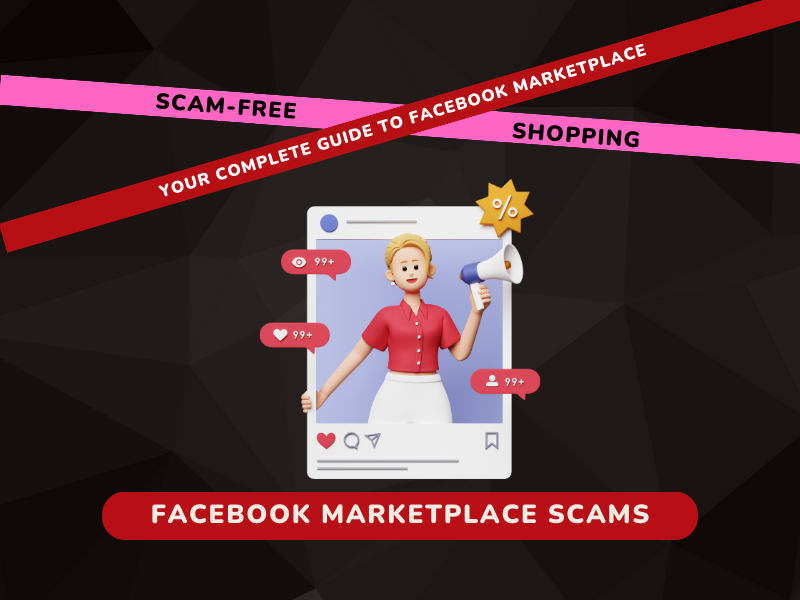Besides other popular online marketplaces like Amazon, eBay, and Craigslist, another online shopping place is gaining popularity: Facebook Marketplace.
The idea of making friends and converting them along with other Facebook users makes it attractive. The fact that Facebook does not charge any fees for using its services is another factor that makes it more attractive.
However, it is also plagued with scammers who are out there to rip off a potential victim.
Regardless of the scammers pulling off Facebook Marketplace scams, you can avoid falling for them by understanding their modus operandi.
In this article, we aim to create awareness and arm you with the necessary knowledge to spot red flags that are quite popular with scammers pulling off Facebook Marketplace scams.
Read also: Facebook Marketplace Local Only: How to Change Location & Use It
Common Red flags in Facebook Marketplace scams
Request to ship the product before payment
Scammers will urge you to pay a deposit or pay in advance to secure your spot for the desired product. However, these scammers will disappear into thin air after receiving the payment.
Since scammers are known for their keen interest in money, they will make ample excuses for you to pay the deposit or the entire amount. If they start using pressure tactics, then it is sure that scammers are on the other end.
Products are available at an unbelievable price
When you want to buy a product, you check it out online. However, some of the products that you may desire may be expensive, like a luxurious watch. It might be available on Facebook Marketplace. If you are getting the same product at a fraction of its original price, then you can be sure that it’s a knockoff or a non-working electronic product.
The best way to check if the product is authentic and in working condition is to meet the seller physically and inspect the product. Ensure that you choose a meeting place in a crowded public area.
Electronic products for sale
You might be interested in the electronic product, but due to financial constraints, you may find it financially challenging to buy that product firsthand. However, several products are available on the Facebook Marketplace at reasonable rates.
While buying the product, ensure that you meet in a crowded public place and request that the seller charge the electronic product. Once you meet, you test the electronic product and check if it works before paying them. Turn it on and check the product thoroughly until your heart’s content.
Several scammers sell useless electronic products that are not working at a reasonable rate. Thus, you may buy the product and only regret it when you go home and check it.
Accidentally paying extra for the product
As a seller, you might find a buyer who overpays for a product you are willing to sell. However, it would be best if you exercised caution since, from time to time, scammers will impersonate a genuine buyer and pull a fast one.
Scammers will generally use a stolen credit card and ask you to pay the extra that has been paid to you. They may also use their credit card to overpay you. Once you pay the extra amount, they will either cancel the order or, if they are using their credit card, ask for a chargeback.
Requesting you send a code that you received on your mobile
Scammers will contact you and begin a conversation regarding the product. Once the conversation moves to text, they will ask you to prove you are real. They will send you a code and ask you to send it back to verify your authentication.
You should avoid it at all costs. Scammers are known to hack into their potential victims’ mobile numbers by using Google Voice. Although the number will be yours, these scammers will pull off all sorts of mischief that will land you in trouble.
If someone asks you to verify your authentication, avoid it. You are not required to authenticate yourself to sell the product.
Fake rentals
Some of the products that appear on Facebook Marketplace may surprise you. You can even rent an apartment on this online marketplace. However, it would be best to exercise caution before shopping for an apartment.
Scammers generally use photos from the internet and claim it is an apartment that they have for rent. These scammers are so smart that they will take the image of a genuine landlord having an apartment for rent and use it to extract money from you.
If you are interested in the apartment or property, contact the listing manager and verify its authenticity. Avoid paying a deposit until you have contacted the manager. Personally, visit the landlord regarding the said property before you transfer the deposit.
So, beware of fake rentals.
Avoid bait and switch
Sellers may put several different products online to attract their potential buyers. However, some products get exhausted very quickly due to their demand. These products may be replenished, or in rare cases, they might be discontinued.
You might be interested in a product and want to pay for it. However, the product you receive may be different from the one you paid for. It depends on whether you wish to keep or return the product. It is a classic bait-and-switch pulled by sellers, as they entice their customers only to hand over a different product.
Preventing lost package claims
Scammers will ask for a product and later claim that they have not received it, even though they would have.
Send shipments with tracking numbers whenever possible if you’re the seller and want to avoid this situation. That way, if a dispute arises, you can always point to the tracking number given by the courier provider as evidence.
Giveaways
When someone moves from one palace to another, they find it challenging to take all the stuff they have bought. In such cases, owners generally give away their stuff for free.
Although getting stuff for free is a good idea, especially if it is in good condition, you should exercise caution when it is out for free to avoid falling for a Facebook Marketplace scam.
Scammers will impersonate a seller and ask you to fill in your sensitive details on an online form that they have put up for those interested in giveaways.
Scammers will collect all the data, convert you into a victim of identity theft, and commit crimes under your identity. These scammers will phish you for information.
Read also: How to Sell and Buy in Facebook Marketplace Louisville Ky
Final Thoughts
Although buying and selling products online is quite easy, you can easily fall victim to such scams. If you fall victim to an online Facebook Marketplace scam, you should try to contact Facebook authorities and report the incident.
You can go and open up the listing and click on the three-dot menu on the right side of the Share button. You will find a dropdown, and choose Report Listing.
If you are a buyer and think that the seller is a scammer, you will find a module titled Sellers Information on the right side of the listing. Hover your cursor over the seller’s name and then click Report. Select Scam, and fill in the details by following the instructions to report the scam.
FAQs [Facebook Marketplace scam]
Facebook marketplace scams Zelle
Zelle is a popular money transfer service many people use to send and receive money quickly. However, scammers have found ways to use the platform to their advantage. Here are some common Zelle scams on Facebook Marketplace:
- Fake buyer scams: Scammers will pretend to be interested in your product and offer to pay through Zelle. Once you accept the payment, they will ask you to ship the product before the money is transferred. Once you ship the product, the scammer will cancel the payment or dispute the transaction, leaving you with no product or money.
- Overpayment scams: Scammers will overpay you for your product and ask you to refund the excess money via Zelle. Once you repay the money, they will cancel the payment or dispute the transaction, leaving you with no product or money.
- Fake seller scams: Scammers will create fake listings on Facebook Marketplace and ask you to pay through Zelle to secure the product. Once you pay, they will disappear without delivering the product.
Facebook marketplace scams asking for phone number
Scammers on Facebook Marketplace may ask for your phone number to carry out their fraud. They may use this information to send you fraudulent text messages or phone calls to gain access to your personal information or money.
Be cautious when sharing personal information with strangers on Facebook Marketplace, and always verify the legitimacy of the buyer or seller before engaging in any transactions. If you suspect a scam has targeted you, immediately report it to Facebook and your local authorities.
Common Facebook marketplace scams
Facebook Marketplace is not immune to scams and fraud attempts. Here are some common Facebook Marketplace scams you should be aware of:
- Overpayment Scam: Scammers offer to buy an item from you but send you a check or money order for more than the agreed-upon price. They’ll then ask you to deposit the check and return the excess money to them. The check will eventually bounce, leaving you out of pocket.
- Fake Payment Scam: A buyer will offer to purchase an item from you but will ask you to ship it to them before they’ve paid. They’ll then send you a fake PayPal confirmation email without the item and payment.
- Phishing Scam: Scammers will pose as Facebook or PayPal representatives and ask you to give them your account information. They’ll then use this information to steal your identity or access your financial accounts.
- Shipping Scam: A buyer will offer to purchase an item from you but will ask you to pay for the shipping costs upfront. They’ll then disappear with the money, leaving you without the item or the payment.
Always be cautious when dealing with strangers on Facebook Marketplace, and never share personal information or send money to someone you don’t know. If you suspect a scam, immediately report it to Facebook and local authorities.
Facebook marketplace scams for sellers
Facebook Marketplace can be a great platform to sell items, but it’s important to be aware of potential scams. As a seller, here are some common Facebook Marketplace scams you should watch out for:
- Payment Scam: A buyer will offer to purchase an item from you but will send a fake PayPal confirmation email without actually paying. They may also claim that their payment is pending and ask you to ship the item before they’ve paid.
- Chargeback Scam: A buyer will purchase an item from you, pay for it, and receive it. But then they’ll file a chargeback with their credit card company, claiming that the item was never received or was not as described. This can result in the payment being reversed and you losing both the item and the payment.
- Lowball Scam: A buyer will offer to purchase an item from you, but their offer will be much lower than your asking price. They may then pressure you to accept the lower offer by claiming they can get the same item for less elsewhere.
- Fake Buyer Scam: A scammer may pose as a buyer and ask for your personal information, such as your PayPal email address or phone number. They may then use this information to steal your identity or access your financial accounts.
Always be cautious when selling on Facebook Marketplace, and never share personal information or ship an item before receiving payment. If you suspect a scam, immediately report it to Facebook and local authorities.
Read also: How to Use Facebook For Small Business Marketing (30 Proven Tips)

